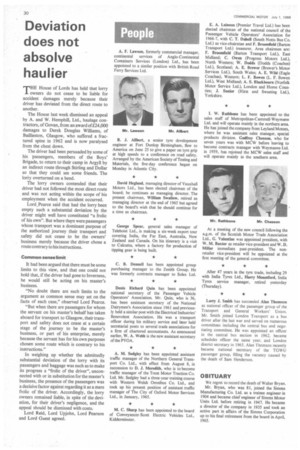Deviation does not absolve haulier
Page 32

If you've noticed an error in this article please click here to report it so we can fix it.
THE House of Lords has held that lorry owners do not cease to be liable for accident damages merely because their driver has deviated from the direct route to another.
The House last week dismissed an appeal by A. and W. Hemphill, Ltd.. haulage contractors, of Govan, from an award of L24,000 damages to Derek Douglas Williams. of Baillieston, Glasgow, who suffered a fractured spine in 1962 and is now paralysed from the chest down.
The driver had been persuaded by some of his passengers, members of the Boys' Brigade, to return to their camp in Argyll by an indirect route through Stirling and Dollar so that they could see some friends. The lorry overturned on a bend.
The lorry owners contended that their driver had not followed the most direct route and was not acting within the scope of his employment when the accident occurred.
Lord.Pearce said that had the lorry been empty such a substantial deviation by the driver might well have constituted "a frolic of his own". But where there were passengers whose transport was a dominant purpose of the authorized journey their transport and safety did not cease to be the owners' business merely because the driver chose a route contrary to his instructions.
Common sense limit
It had been argued that there must be some limits to this view, and that one could not hold that, if the driver had gone to Inverness, he would still be acting on his master's business.
"No doubt there are such limits to the argument as common sense may set on the facts of each case," observed Lord Pearce.
"But when there are passengers for whom the servant on his master's behalf has taken aboard for transport to Glasgow, their transport and safety does not cease at a certain stage of the journey to be the master's business, or part of his enterprise, merely because the servant has for his own purposes chosen some route which is contrary to his instructions."
In weighing up whether the admittedly substantial deviation of the lorry with its passengers and baggage was such as to make its progress a "frolic of the driver", unconnected with or in substitution for the master's business, the presence of the passengers was a decisive factor against regarding it as a mere frolic of the driver. Accordingly, the lorry owners remained liable, in spite of the deviation, for their driver's negligence, and the appeal should be dismissed with costs.
Lord Reid, Lord Upjohn, Lord Pearson and Lord Guest agreed.




























































































































